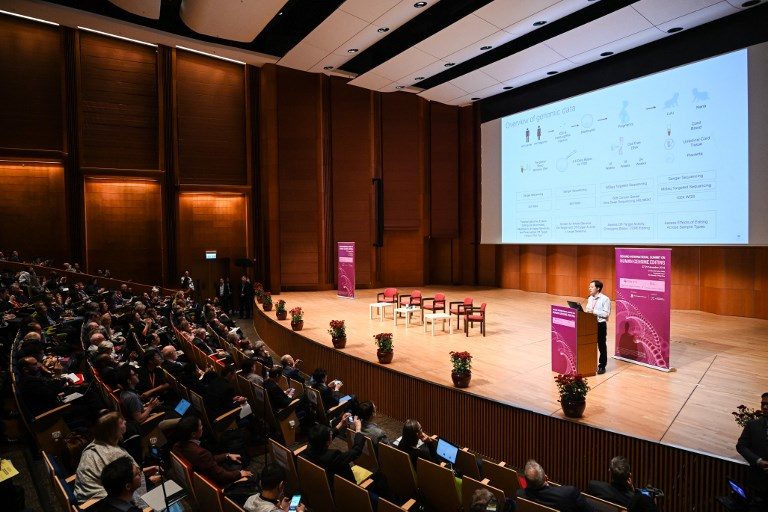SUMMARY
This is AI generated summarization, which may have errors. For context, always refer to the full article.

HONG KONG, China – A scientist who upended a Hong Kong conference with his claim to have created the world’s first genetically-edited babies cancelled a fresh talk and was heavily criticized by organizers Thursday, November 29, who labelled him as irresponsible.
He Jiankui had told a packed biomedical conference Wednesday, November 28, he was “proud” to have successfully altered the DNA of twin girls born to an HIV-positive father, an apparent medical breakthrough.
But details of the experiment, which has not been independently verified, triggered an immediate backlash and He said the trial had been halted.
The founder of an HIV support group reported to be based in Beijing said Thursday that he regretted introducing families to He for the trial, according to local media.
Bai Hua, the group’s head, said he had introduced 50 families to He’s team.
“In the beginning we did not understand what it was they were really doing. Actually right now my personal feeling is that they are a bit crazy,” he told RTHK.
Bai added that he had spoken to two of the families involved in the trial and questioned whether the risks and ethical issues had been fully explained to them.
“The team all along emphasized that the chance of success was high, and that there were risks, but they were low,” he told RTHK.
Professor He was supposed to speak at the summit again Thursday but disappeared from the schedule.
David Baltimore, a Nobel laureate and chairman of the organising committee, told reporters it was He’s decision not to attend.
Organizers of the Second International Summit on Human Genome Editing denounced He’s “unexpected and deeply disturbing” claim that human embryos had been edited and implanted, and called for closer supervision of the field at the conclusion of the conference Thursday.
“Even if the modifications are verified, the procedure was irresponsible and failed to conform with international norms,” they said in a statement.
“Its flaws include an inadequate medical indication, a poorly designed study protocol, a failure to meet ethical standards for protecting the welfare of research subjects, and a lack of transparency in the development, review and conduct of clinical procedures,” it added.
Life-long impact
University professor He, based in the southern Chinese city of Shenzhen, said the twin girls, born a few weeks ago, had their DNA altered to prevent them from contracting HIV. Eight volunteer couples – HIV-positive fathers and HIV-negative mothers – signed up to the trial, with one dropping out before it was put on hold.
He said there had been “another potential pregnancy” involving a second couple, but it is unclear whether that pregnancy is still ongoing.
Experts warned that editing human embryos can create unintended mutations in other areas – so-called “off-target effects” – which can have an impact through the lifetime.
Southern University of Science and Technology distanced itself from He, saying he had been on unpaid leave since February and had “seriously violated academic ethics”.
He, who was educated at Stanford University, said the twins’ DNA was modified using CRISPR, a technique which allows scientists to remove and replace a strand with pinpoint precision.
Co-creator of the technology Jennifer Doudna said she felt “horrified” at hearing He’s talk, adding she felt deeply concerned for the people affected and questioned whether they really understood the procedure.
Summit organizers said germline genome editing could become “acceptable” in future if rigorous criteria are met, including “strict independent oversight”.
However they added that there were too many scientific and technical uncertainties to permit clinical trials at this stage. – Rappler.com
Add a comment
How does this make you feel?
There are no comments yet. Add your comment to start the conversation.